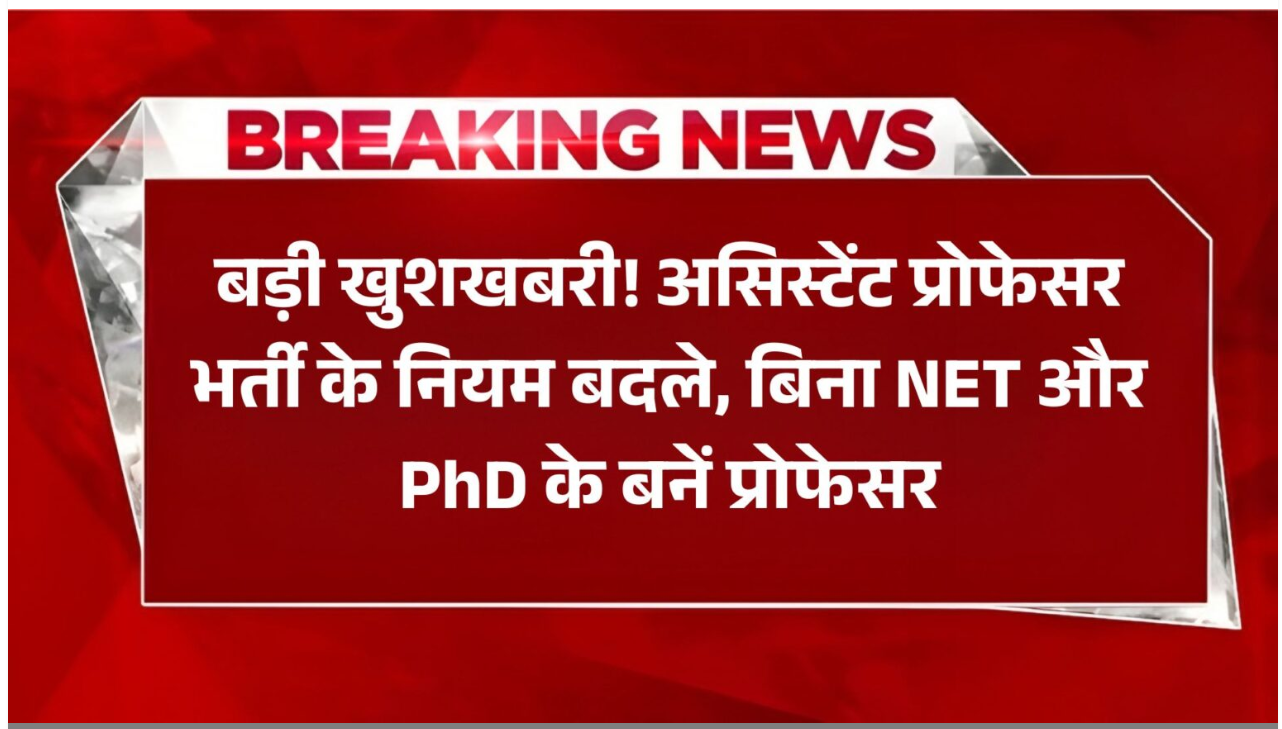UGC NET New Rules 2025: Big Changes in Assistant Professor Recruitment and Benefits for Master’s Degree Holders
UGC NET New Rules 2025: Today, we have some exciting news that will bring significant changes to the education sector in India. The University Grants Commission, or UGC, has proposed new rules for the recruitment of Assistant Professors, which could change the way we look at academic careers. These changes are set to offer big benefits, especially for Master’s degree holders.
The UGC has recently proposed new eligibility criteria and guidelines for Assistant Professor recruitment, aiming to make the process more inclusive, flexible, and aligned with the goals of the National Education Policy 2020.
So, what’s changing in the recruitment process for Assistant Professors, and how do these changes impact you? Let’s dive in!
New Eligibility Criteria for Assistant Professor Posts
Previously, the National Eligibility Test or NET was mandatory for candidates aspiring to become Assistant Professors in Indian universities. However, UGC’s latest proposal has removed the mandatory requirement of the NET exam.
This is a big shift! Now, Master’s degree holders will have an opportunity to apply directly for the Assistant Professor position. Let’s break down the new eligibility criteria:
- Candidates who hold a Master’s degree in disciplines like ME or MTech with at least 55% marks will now be eligible for Assistant Professor roles.
- PhD holders who have scored 75% in their Bachelor’s and 55% in their Master’s can also apply.
- Additionally, candidates who have passed NET, SLET/SET, or equivalent exams can still apply. But here’s the important point: NET is no longer mandatory.
This move will open the doors for many candidates who struggled to qualify due to the NET requirement, giving them a fairer chance to pursue a career in teaching.
Professionals from Different Sectors Can Now Apply
Another major change is that UGC aims to attract professionals from various fields like industry, public administration, research, and policy-making to academic positions.
This means experienced professionals, such as those from the industrial sector, public policy experts, and senior researchers, will now be able to apply for academic positions. UGC hopes this will bring in fresh ideas and experiences that can enrich the teaching and learning environment in universities.
Changes for Vice-Chancellor Recruitment
UGC has also proposed new rules for the recruitment of Vice-Chancellors. Now, professionals with 10 years of senior-level experience in sectors like industry, public administration, policy-making, or PSU will be eligible for the position of Vice-Chancellor.
Furthermore, the Vice-Chancellor selection committee will now consist of three members: a representative from the Visitor or Chancellor, the UGC, and a nominee from the university’s top governing body.
Increased Emphasis on Research and Publications
Another key change is the emphasis on academic research. The new rules require candidates to have at least 8 research papers published in reputed journals. Alternatively, candidates can also fulfill this requirement by publishing book chapters, books, or securing patents.
This change is aimed at enhancing the research quality in Indian universities and ensuring that academic staff have a strong research background.
Promoting the Use of Indian Languages in Education
In line with the goals of the National Education Policy, UGC is also pushing for more teaching and publishing in Indian languages. This will not only help preserve our cultural heritage but also make education more accessible and inclusive.
By encouraging academic contributions in regional languages, the education system can become more relevant to a wider audience and reflect the diversity of India.
New Promotion Criteria for Associate Professors
When it comes to promotions, UGC has introduced new criteria for Associate Professors as well. This includes specific guidelines for disciplines like law, humanities, science, and engineering, among others.
For example, teachers will be evaluated based on their innovative teaching contributions, research or teaching laboratory development, and even the ability to secure funding for research projects.
Impact of the New Rules
[Cut to visuals: Professors, researchers, and students engaged in vibrant academic discussions.]
The new rules are expected to have a wide-reaching impact on India’s higher education system.
- Diversity in Recruitment: The inclusion of professionals from various fields will bring new perspectives to teaching.
- Opportunities for Young Talent: The removal of the NET requirement means that more talented individuals will be able to enter the teaching profession.
- Enhanced Research Output: The increased focus on research will help improve the quality of education and foster an environment of innovation.
- Promotion of Indian Languages: By encouraging publications in regional languages, the new rules will help preserve and promote India’s linguistic diversity.
UGC has asked for feedback on these new rules from all stakeholders, and the last date to submit feedback is 5th February 2025.
So, if you are a student, a teacher, or anyone interested in these changes, make sure to participate and share your thoughts!To sum it up, these new UGC rules for Assistant Professor recruitment are a big step towards making India’s education system more inclusive, flexible, and research-oriented. If you’re an aspiring academic, this could be your time to shine!

